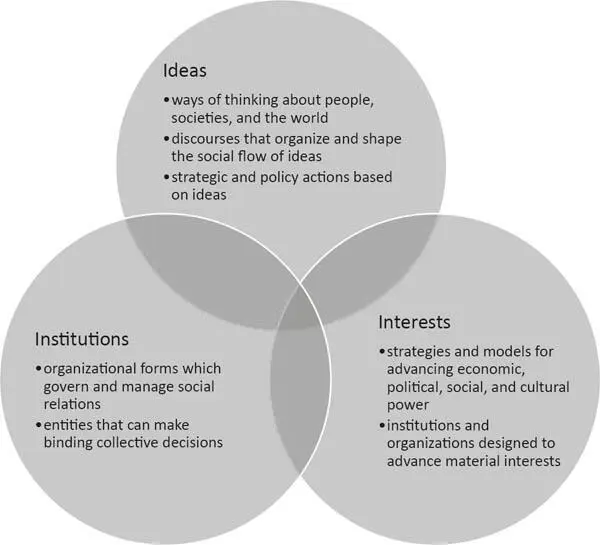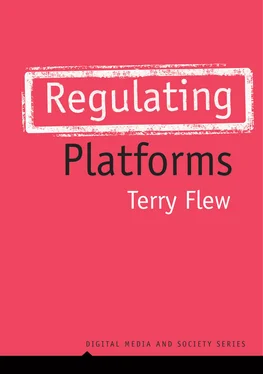At one level, it is not surprising that powerful interests would advocate for minimal government controls. Economic power correlates with political power and the power to shape public ideas, and the period from the 1990s to the present day saw Apple, Alphabet (the name of Google’s parent company), Microsoft, Facebook, Amazon, and other information and communication technology (ICT) companies become the world’s most powerful brands and most highly capitalized organizations. But I would argue that it is insufficient to see the discourse of what I will term the libertarian internet simply as the ideological manifestation of the rising power of digital technology companies – ‘big tech’, as they came to be referred to by their critics, whose voices have grown far more prominent in the 2020s (Couldry and Mejias, 2019; Keen, 2018; Orlowski, 2020; Teachout, 2020; Warren, 2019; Zuboff, 2019). At the same time, as I will explain below, libertarian ideas developed alongside a complementary communitarianism and was accompanied by the idea that the digital abundance that new technologies afford can create a new age of sharing and a new form of gift economy – one that maybe transcends the old world of proprietary systems and intellectual property (Barlow, 1996b; Rheingold, 1994).
The Three Is: Ideas, Interests, and Institutions
In this book I develop the proposition that the social and economic expansion of digital technology in general and of digital platforms in particular can be understood as occurring at the intersection of three elements (see Figure 1.1):

Figure 1.1 Ideas, Interests, and Institutions. Created by author.
1 (1) ideas: ways of thinking about material objects and relationships that rise to prominence and gain general social acceptance but are challenged by other competing ideas;
2 (2) interests: institutions and organizations that seek to advance their individual or collective social power in the economic, political, and cultural spheres;
3 (3) institutions: organizational forms that both govern and regulate social, economic, and political relations and through which collective decision-making occurs.
I have noted that libertarian ideas strongly influenced the internet’s early history. No less significant was the influence of countercultural ideas and digital utopianism on the development of the information technology industry, which has been noted by authors such as Fred Turner (Lusoli and Turner, 2021; Turner, 2006), Tom Streeter (2011), and Manuel Castells (2001). The distinctive culture of Silicon Valley produced unusual affinities between ‘hippies’ and ‘suits’, tech entrepreneurs and digital communitarians, and scientists and hackers. This phenomenon had its roots in the counterculture of the late 1960s and 1970s associated with the New Left (Castells, 2001; Hafner and Lyon, 1998; Turner, 2006).
For ideas to have a lasting influence, they need to connect to other elements. This pertains to what the French philosopher and social theorist Michel Foucault described as the materiality of discourses and the mutually constitutive relationship between institutional forms and discursive practices. For Foucault, discourses are not simply the words we use to describe things. Rather they have what he called ‘positivity’: an ability to shape social reality and the way it is understood. His historical interest was in ‘the positivity of discourses, their conditions of existence, the systems which regulate their emergence, functioning and transformation’ (Foucault, 1991, p. 69). This is not to say that everything is simply discourse, or that reality is subsumed to systems of representation. But it is to recognize that the relationship between discourses and other practices is complex and shifting. The rise of particular discourses to dominance over others is integrally connected to their capacity to be adopted within, and to be shaped by, powerful social institutions. At the same time, the way individuals conduct themselves within institutions and the ways in which those institutions in turn seek to shape their external environment are discursively framed. Organizational theorists have observed that institutions have not only a regulative function – they set rules, laws, sanctions, and so on – but also a normative and a cultural–cognitive function, insofar as they provide frameworks of moral governance, symbolic representations, and systems of belief that offer individuals shared frameworks for producing meaning (Scott, 2014). In his analysis of Foucault’s work on discourses, Gilles Deleuze observed that ‘any institution implies the existence of statements such as a constitution, a charter, contracts, registrations and enrolments. Conversely, statements refer back to an institutional milieu which is necessary for the formation both of the objects which arise in such examples of the statement and of the subject who speaks from this position’ (Deleuze, 1988, p. 9).
This focus upon ideas and how they generate discourses allows us to capture the significance of what otherwise looks like overblown rhetorical flourishes of the early years of the internet. In their cyber Magna Carta, as they referred to their work, Dyson et al. (1994) associated the internet with the ‘overthrow of matter’ and with the death of mass culture and bureaucratic organization. In the following year, Nicholas Negroponte, the director of the MIT Media Lab, argued that ‘[c]omputing is not about computing any more. It is about living’ (Negroponte, 1995, p. 6). In a highly influential account of the development of the MIT Media Lab, Stewart Brand (1987, p. 255) observed: ‘Technology marches on, over you or through you, take your pick’. When the computer scientist Vinton Cerf, ‘the father of the internet’, was offered a position by Google, he chose for himself the title of ‘chief internet evangelist’ (Flew, 2014a). John Brockman spoke of a community of ‘digerati’ who ‘evangelize, connect people, adapt quickly’ (Brockman, 1996, p. xxvii), while Dyson et al. (1994) associated the internet with an ‘accelerating demassification [that] creates the potential for vastly increased human freedom’.
Many of these propositions are pro-capitalist, and yet curiously anti-corporate. This was a particular form of capitalism – Randian capitalism, perhaps – which stressed the power of the individual rather than of the corporation. No less a figure than President Ronald Reagan, in the 1985 presidential address that followed his re-election, observed: ‘We have lived through the age of big industry and the age of the giant corporation. But I believe that this is the age of the entrepreneur’ (Reagan, quoted in Streeter, 2011, p. 69). From Steve Jobs to Elon Musk, the rebel, the disruptor remains a central figure in Silicon Valley culture. The work of the Austrian economist Joseph Schumpeter was highly influential in this respect, as it identified capitalism as a complex evolutionary system, characterized by conflict and contradiction and by ‘gales of creative destruction’ (McCraw, 2007). Schumpeter himself was described as a ‘bourgeois Marxist’ (Catephores, 1994) and his account of the long waves of capitalist development was influential, as it placed innovation and entrepreneurship at the dynamic centre of capitalist economies and focused upon the entrepreneur as disruptor of the established institutional order.
In an important early critique of such arguments, Barbrook and Cameron referred to ‘the Californian ideology’, which gave ‘a technological proof to a libertarian political philosophy’ (Barbrook and Cameron, 1996, p. 44) and accommodated a curious mix of free market economics and countercultural radicalism. It did so by making room for an opposition between newly empowered individual users of technology and the state, while downplaying the extent to which the internet itself was the byproduct of heavy investments in communications infrastructure led by the US Department of Defence (Mazzucato, 2015). According to Barbrook and Cameron (1995, p. 46), the core of the Californian ideology consisted of the propositions that ‘information technologies … empower the individual, enhance personal freedom, and radically reduce the power of the nation-state’ and that ‘attempts to interfere with the emergent properties of technological and economic forces, particularly by the government, merely rebound on those who are foolish enough to defy the primary laws of nature’.
Читать дальше











